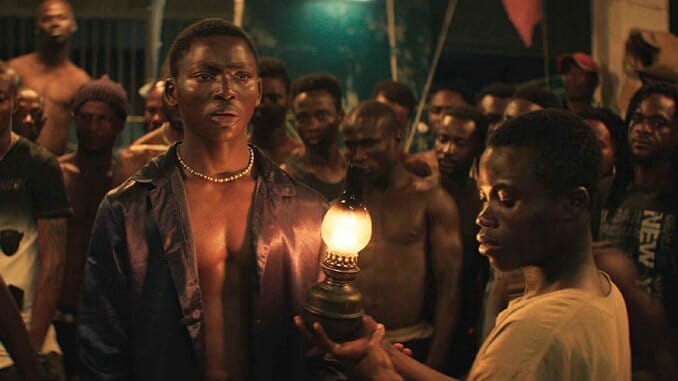Gather around and Listen to Night of the Kings‘ Enthralling Stories

The unnamed young protagonist (Bakary Koné) in Night of the Kings, French-Ivorian director Philippe Lacôte’s latest film, arrives at the Holding and Corrections Prison of Abidjan—referred to by its French acronym, MACA—handcuffed to a pickup truck. But his bonds appear ceremonial: MACA, settled within the Ivory Coast’s Banco forest, is so segregated by greenery from the country’s economic capital that shackles and walls feel like mocking formalities rather than necessities. The prison population is more interned by nature than by MACA’s guards, who treat the prisoners with an ambivalence bordering on fear in recognition that they’re equally trapped. Night of the Kings is a prison film, but unlike most prison films, getting out becomes more figurative than literal.
The characters here coalesce around the newcomer’s presence not in greeting, but out of eagerness and opportunity. The men jailed at MACA run the place, and rival factions with their own power grab schemes seize on Koné’s character as a lever for gaining control. There’s upstart Lass (Abdoul Karim Konaté), cocky and driven by a business-minded approach to governance, and there’s the current king—or Dangôro—Blackbeard (Steve Tientcheu), old, graying, ill and too aware of his own mortality. Custom dictates that when the Dangôro can’t run the show any longer, he has to name an heir and commit suicide. Blackbeard respects that custom more than Lass, who’d like very much to bump off Blackbeard sooner rather than later.
So Blackbeard, wise and patient, invokes the “Night of the Roman,” a ritual that takes place only on a Blood Moon, which just so happens to have risen over Banco. On this eve, a storyteller dubbed “Roman” is chosen to regale the prisoners with tales and yarns until the sun comes up, and when it does, they’re ritually sacrificed as tradition dictates. In Night of the Kings, that poor sap is Lacôte’s anonymous lead, pounced upon by Blackbeard almost immediately and told nothing of his role beyond the inherited name and his role as raconteur. He doesn’t know he’s going to die. He just knows that he has to entertain the masses without stopping, like carrying out a Senate filibuster to keep at bay an undesirable legislative vote.
The film is self-defined but vague at the same time, with clearly outlined rules enveloped in a haze of magical realism couched directly in Roman’s narration. From MACA to the life and times of outlaw hero Zama King (leader of the Abidjan street gang known as the Microbes) to Ivory Coast plains where a sorceress queen (Ivorian artist Laetitia Ky) wars with a wizard who dares challenge her reign, Night of the Kings is a transportive movie. For American audiences, this is true on every conceivable level: Lacôte and cinematographer Tobie Marier-Robitaille take these viewers from the U.S. to Côte d’Ivoire, from freedom to internment, from order to chaos, from reality to fabrication. This dynamic, of course, extends in a lesser capacity to those listening to the stories within the story. MACA’s prisoners find themselves so gripped in Roman’s thrall that they briefly (and metaphorically) leave the prison behind and journey with him to the worlds he describes, real and imagined alike.
-

-

-

-

-

-

-

-

-

-

-

-

-

-

-

-

-

-

-

-

-

-

-

-

-

-

-

-

-

-

-

-

-

-

-

-

-

-

-

-








































